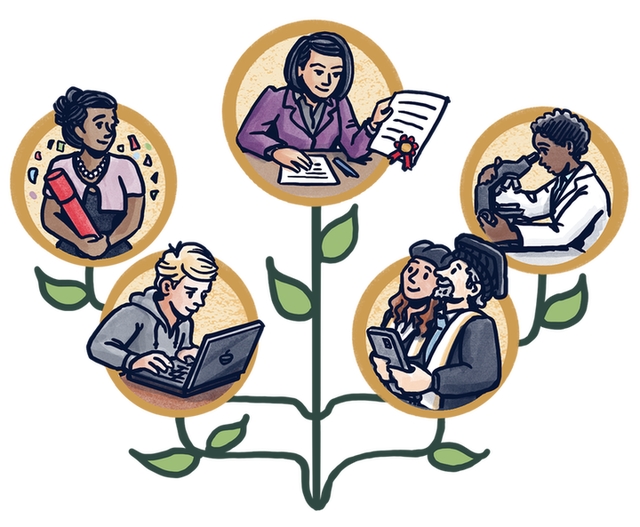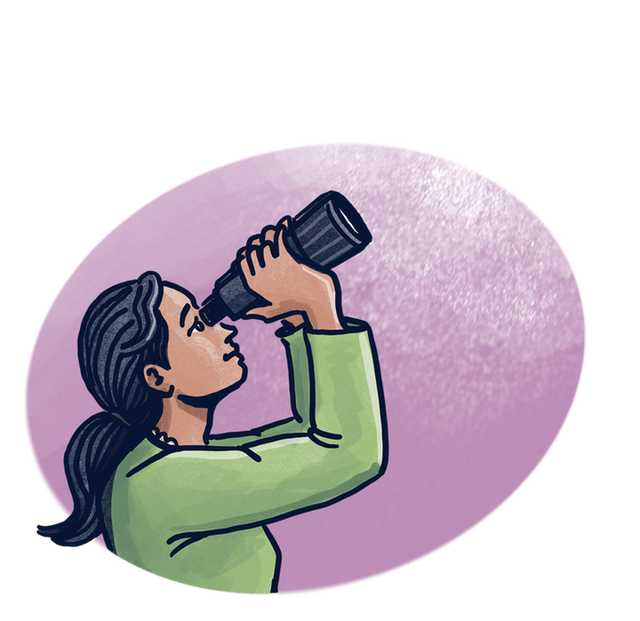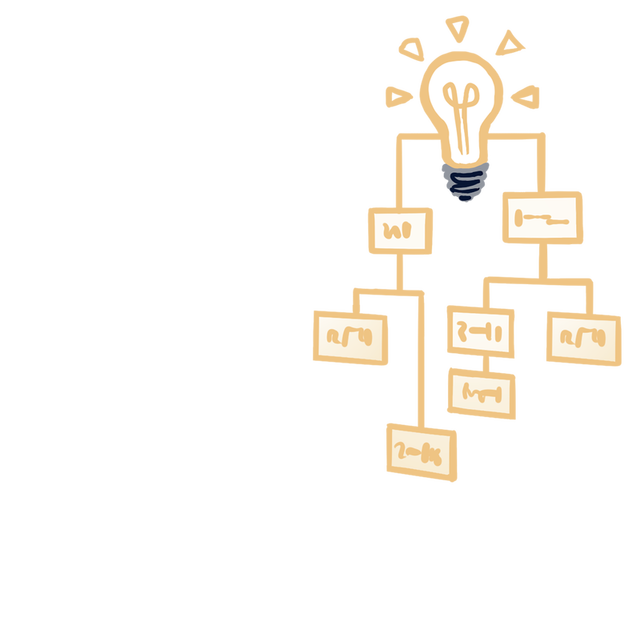5
What’s the long-term picture?
Higher education
and research policy
5.1
Governmental research policy
In 2019, the government issued a report on research policy (‘Curious and committed - the value of science’ / ‘Nieuwsgierig en betrokken – de waarde van wetenschap’). It described its ambitions as follows: 1) Dutch science has global impact - Being one of the world’s leaders requires cooperation and a strong system; 2. Science is connected to society - Everyone should be able to enjoy the fruits of our scientists’ labours; 3) The Netherlands is a breeding ground and a harbour for talent - Training and retaining diverse talent provides a strong foundation.
The Netherlands is one of the few countries in the world in which nearly all of the universities are listed in international rankings. The small geographical separations within the Netherlands also help foster collaborations between universities and national research institutes – making the setting even richer.
The Rathenau Institute gives instructive overviews of the governance of science, the funding of science and all kinds of figures on science.
5.2
Top sectors
There has been a strong push in the Netherlands to streamline research towards addressing real-world challenges. This is the main thrust of the ‘top sectors policy’ (topsectorenbeleid), which aims to take state-of-the-art research to the private sector as well as to government and civil society organisations, thereby promoting what is referred to as the ‘knowledge economy’ (kenniseconomie). The Dutch government invests millions of euros annually in private-public partnerships geared towards knowledge generation and innovation with the aim of finding solutions to the challenges facing society. Researchers who come to the Netherlands should be aware that NWO allocates quite a lot of funding to research that contributes to the top sectors policy.
Ten top sectors are currently receiving strategic funding through this channel: Agriculture & Food, Chemistry, Creative Industry, Energy, High Tech, Logistics, Life Sciences & Health, Horticulture & Propagation Materials, Water and Climate, and Digital Delta (ICT).
To qualify for funding, researchers need to form consortia with businesses, industrial, government or civil society organisations, which must commit ‘in kind’ by allocating staff and/or by making actual financial contributions. You can check this website (in Dutch) for details about the specific questions and problems per sector, as well as the NWO webpages dedicated to the Knowledge and Innovation Covenant (KIC). The NWO instruments for the KIC provide funding for fundamental and practical research in public-private partnerships. The set of instruments consists of four main lines, for which 118 million euros has been reserved each year.
5.3
Dutch National Research Agenda
The Netherlands has gained recognition in recent decades for its effective approach to capitalising on society-driven investment. In line with these efforts, the government launched a unique initiative in 2015 by inviting the general Dutch public as well as research and education organisations to formulate major research questions, with the idea that these questions should drive the Dutch research agenda in years to come. Based on the results of this national consultation, a ‘knowledge coalition’ (Kenniscoalitie: UNL, VNO-NCW, TO2, MKB Nederland, KNAW, Vereniging Hogescholen, NFU and NWO) prepared the Dutch National Research Agenda (Nationale wetenschapsagenda, NWA), which features 140 cluster questions and 25 ‘routes’.
While the Dutch National Research Agenda is a direct initiative by the government, NWO was involved in its design and development, alongside other participants in the knowledge coalition. Close links have been established between NWO as an organisation and the NWA as a guideline for research policy.
5.4
Research and teaching assessments
Every research group and centre at Dutch universities, as well as the NWO-I and KNAW institutes, is subject to an assessment (onderzoekvisitatie) every six years. This happens according to the research quality criteria listed in the national Strategy Evaluation Protocol (SEP). UNL, NWO and the KNAW regularly update the SEP. External review committees are asked to use the methods and criteria listed in the SEP, which also sets the agenda for internal assessments of faculties, units, groups, labs, centres and individual researchers at Dutch universities and research institutes.
The SEP serves as an instrument for measuring the academic quality of research conducted at Dutch universities and research institutes, and for assessing its societal relevance, usually over the past six years. An external committee consisting of independent experts in a particular field assesses the unit’s performance and its self-defined research goals and strategy, usually based on a research report produced by the unit and a site visit or interview with representatives of the same unit. The self-assessment should cover specific aspects such as open science, academic culture, HR policy and PhD policy. Research units receive qualitative assessments based on the evaluation of (1) the quality of research, (2) social relevance to society, and (3) the viability of the research group.
There is a similar cycle of teaching assessments (onderwijsvisitatie) in which a panel of independent experts assesses a unit’s teaching performance. The panel is assembled by the Accreditation Organisation of the Netherlands and Flanders (Nederlands-Vlaamse Accreditatie Organisatie, NVAO, see Section 3.3), which has the power to renew or cancel a programme’s accreditation. Because government funding and accreditation depend on both the research assessment and the teaching assessment, they are important milestones for academic research and teaching units in the Netherlands. Academic staff are expected to contribute actively to the success of these assessment exercises.
Lastly, academics should expect an annual personnel review (jaargesprek) with their line manager (often the director of the research unit). In these discussions, research and teaching performance are discussed. These are occasions in which the specific conditions for promotion, e.g., to associate or full professor, can be discussed.
5.5
Recognition and rewards
In 2019 the universities, university medical centres, research institutes and research funders (UNL, NFU, KNAW, NWO and ZonMw) presented the position paper 'Room for everyone's talent - towards a new balance in recognizing and valuing scientists' introducing the new Recognition & Rewards programme. The program was launched to work towards a new balance in recognizing and rewarding academics. It consists of five pillars:
- Diversifying and vitalizing career paths
- Achieving balance between individual and the collective
- Focus on quality
- Stimulating open science
- Stimulating academic leadership.
All participants in the programme have set up committees that work on the Recognition and Rewards in their organization. It requires a culture change as well as national and international coordination between all parties involved. On the Recognition and Rewards website you can find links to the individual website of the stakeholders in the programme, news and stories.
Het gebruik van woorden
Uit onderzoek blijkt dat het gebruik van woorden die over het algemeen als vrouwelijk worden beschouwd andere genders vaak niet afschrikken, terwijl woorden die over het algemeen als mannelijk worden beschouwd vrouwen ervan kunnen weerhouden te solliciteren.
Woorden die over het algemeen als vrouwelijk worden beschouwd
Aardig, bedachtzaam/zorgzaam, begripvol, behulpzaam, beleefd, bereidwillig, bescheiden, betrokken, betrouwbaar, flexibel/meegaand, groepsgericht, communicatief, coöperatief, creatief, eerlijk, emotioneel, empathie/empathisch, enthousiast, vrouwelijk, gevoelig, gezellig, aanhankelijk, humaan, onderling afhankelijk, interpersoonlijk, klantvriendelijk, loyaal, medelevend, menselijk, nauwgezet/precies, onderdanig, open, ordelijk, plezierig, sociaal, ondersteuning/ondersteunend, stil/op zichzelf, sympathiek, toegewijd, veelzijdig, verantwoordelijk, verbindend/verbonden, verwantschap, vleiend, dociel, vriendelijk, vrolijk, warm, zachtaardig, voorzichtig
Woorden die over het algemeen als mannelijk worden beschouwd
Actief, agressief, analytisch, assertief, atletisch, autonoom, avontuurlijk, vastbesloten, besluitvaardig, bluffen/opscheppen, chemisch, commercieel, competent, competitief, deskundig, direct, doelgericht, vastberaden, effectief, dominant, energiek, fanatiek, gedreven, gretig/hebzuchtig, overdreven, obstinaat, handig, hiërarchisch, impulsief, individueel, individualistisch, industrieel, ingenieus, innovatief, koppig/star, kracht, kritisch, leider/leiderschap, logisch, mannelijk, mening, moed, moedig, meedogenloos/roekeloos, objectief, zelfstandig, ondernemend, praktijkgericht, principieel, professioneel, resultaatgericht, snel, solide, sterk, stressbestendig, superieur, technisch, leidend, uitdagend, vijandig, volhardend, onafhankelijk, zelfsturend, zelfverzekerd, zelfvoorzienend
Bron: Direction’s research Inclusive Recruitment and Selection (2016), p. 18/19, Vervecken, Verwijvel, Gijbels & Van den Bossche, P. (2015), Pennebaker, Booth & Francis (2007).
Colophon
2022 The Young Academy (De Jonge Akademie)
© Some rights reserved.
Usage and distribution of this work is defined in the Creative Commons License, Attribution 4.0 Netherlands. (CC BY-NC-SA 4.0)
ISBN: 978-90-6984-751-1
The Young Academy
PO Box 19121, NL-1000 GC Amsterdam T+31 (0)20 551 0702
dja@knaw.nl
The Young Academy is an independent part of the Royal Netherlands Academy of Arts and Sciences
Text: Raf de Bont, Tatiana Filatova, Jason Hessels, Nathalie Katsonis, Christian Lange
Illustrations: Rachelle Meyer
Design & realisation: WAT ontwerpers
Platform: H5mag.com
Preferred citation: The Young Academy (2022). A beginner’s guide to Dutch academia, Amsterdam


